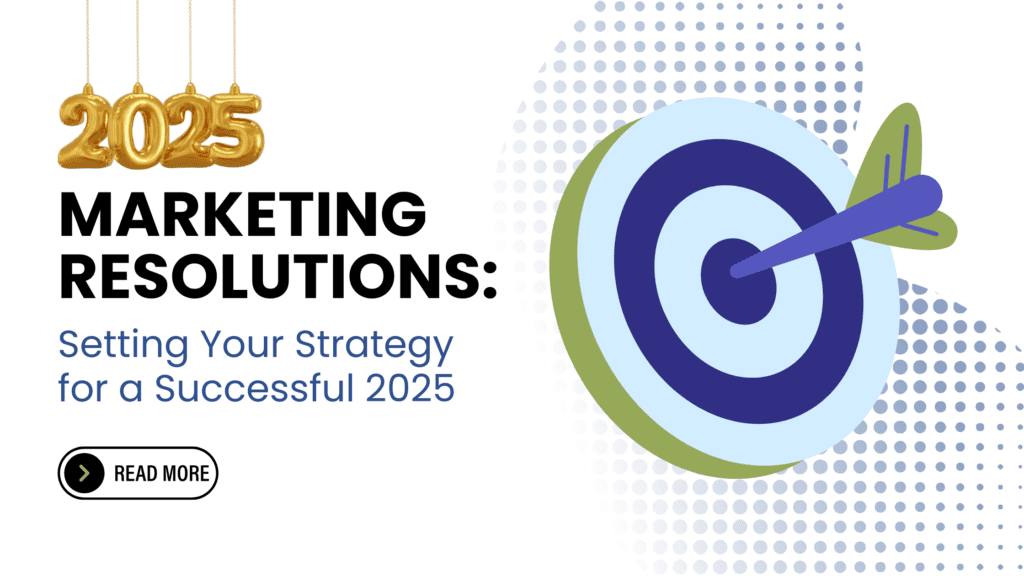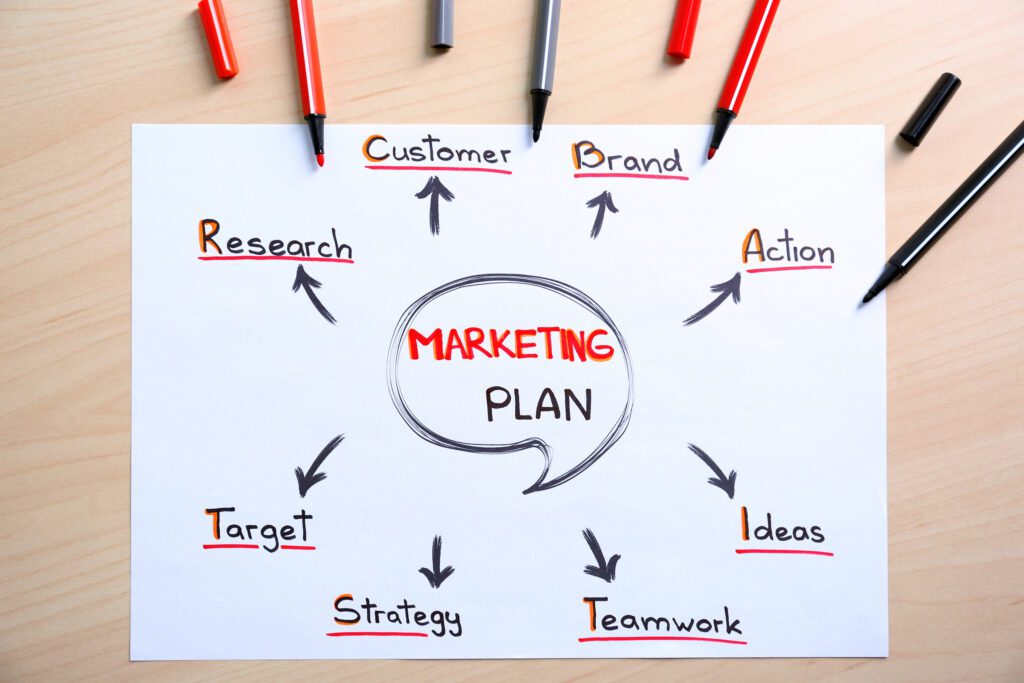Marketing Goals: Setting Your Strategy for a Successful 2025

- Creating a focused and accountable 2025 strategic plan that supports long-term business goals is important for your success in 2025 and beyond
- Important trends for 2025 include AI personalization, voice search, interactive content, sustainability, and privacy-centric marketing.
- To achieve success, make your 2025 goals specific, break them into smaller steps, and track progress while staying flexible to adapt when needed.
Hello, and welcome to the Cognisus Marketing Solutions blog! As we approach the new year, it’s the perfect time to set your marketing strategy for 2025. In this blog, we’ll look into the importance of marketing goals and how they can shape your business’s success. Over the next few months, we’ll explore the most effective ways to plan, execute, and adjust your marketing strategy to ensure you’re on the right track for the year ahead.
Why Do Marketing Goals Matter?
Marketing goals act as a roadmap for success. They provide a structured approach to achieving your goals while helping you prioritize resources and efforts. Without a well-defined plan, it’s easy to lose focus or fall into the trap of reactive decision-making.
By setting clear and actionable goals, you make sure your marketing strategy remains proactive, strategic, and aligned with your long-term objectives. This helps you stay focused on what matters most and avoid distractions.
Reflecting on 2024: Learn Before You Leap
Before jumping into planning for 2025, take a moment to evaluate your 2024 marketing efforts. Reflection is key to identifying what worked, what didn’t, and where you can improve.
Ask yourself:
- What tactics and campaigns delivered the highest ROI?
- Which channels underperformed, and why?
- Did your audience’s preferences or behaviour shift in any noticeable way?
For instance, if your social media ads saw a decline in engagement, it might indicate the need to tweak your messaging or explore new platforms. Alternatively, if your email marketing drove consistent results, consider doubling down on personalization to boost conversions further.
Using tools like Google Analytics, CRM reports, or customer surveys can offer valuable insights. These data points will serve as the foundation for setting realistic and impactful 2025 goals.
Emerging Marketing Trends for 2025
Trends evolve rapidly, reshaping how businesses connect with their audience. Staying ahead of the curve is essential for business owners who are trying to stay competitive.
Here’s a deeper dive into what 2025 might hold:
Artificial Intelligence (AI) in Personalization
AI will play a significant role in marketing in 2025, driving hyperpersonalization. Expect AI-powered tools to analyze customer behavior to suggest products, craft individualized emails, or optimize ad placements.
AI-powered chatbots can provide personalized product recommendations based on browsing history and purchase behavior. Companies leveraging AI can anticipate customer needs, making interactions more meaningful and efficient.
Voice Search Optimization
With the increasing use of smart speakers and voice assistants like Alexa and Google Assistant, voice search is set to grow significantly. This trend emphasizes the need for conversational keyword integration and localized content. Brands should adapt their SEO strategies to include natural language queries and focus on user intent. Optimize for long-tail voice search queries like “best pizza near me” or “how to change a tire.”
Interactive Content
Static posts and ads are being replaced by interactive content like polls, quizzes, augmented reality (AR) filters, and shoppable videos. Interactive elements capture attention and improve engagement by offering users an active role in the experience. For example, an AR tool that allows customers to visualize how furniture would look in their homes bridges the gap between online and offline shopping.
Focus on Sustainability
Consumers are becoming more conscious of a brand’s environmental and social impact. Highlighting sustainable practices and transparent business ethics will help businesses stand out. Marketing campaigns that emphasize eco-friendliness and inclusivity will resonate with socially aware audiences.
Privacy-Centric Marketing
Data privacy regulations are tightening globally, requiring marketers to rethink how they collect and use customer information. First-party data strategies, which collect and use all available data about a customer to create an all-encompassing profile of the individual customer or business, like loyalty programs and direct surveys, will gain traction as third-party cookie reliance diminishes. Building trust will become a cornerstone of marketing success in this privacy-conscious era.
Short-Form Video Marketing
Short-form video content has exploded in popularity, especially among younger demographics. Platforms like TikTok and Instagram Reels allow brands to create engaging and shareable content in a concise format.
The Rise of Social Commerce
Social media platforms are starting to integrate e-commerce features, allowing users to discover and purchase products directly within the app. This trend is particularly strong on platforms like Instagram and TikTok, where users can shop directly from influencer posts or branded content.
The Metaverse and Its Potential for Marketing
The metaverse, a collective virtual shared space, offers exciting opportunities for brands to engage with consumers in immersive and interactive ways. While still in its early stages, the metaverse has the potential to revolutionize marketing by creating virtual brand experiences, product launches, and community-building initiatives.
How to Create Marketing Goals That Stick

Crafting goals is one thing—ensuring they’re actionable and achievable is another. Here’s how you can create goals that don’t fizzle out by February:
1. Be Specific and Measurable
Generic goals like “improve social media presence” often fail because they lack direction. Instead, aim for something specific, like “Increase Instagram engagement by 20% by Q2 through consistent posting and community interaction.”
When goals are measurable, tracking progress becomes easier.
2. Align Goals with Business Objectives
Your marketing goals should serve the broader goals of your business. If your company aims to expand its customer base, focus on strategies like lead generation, email marketing, or improving website SEO.
3. Break Them Into Smaller Steps
Overwhelming goals can lead to burnout or procrastination. Break down each goal into smaller, manageable steps. For example, if one goal is to “launch a successful content marketing campaign,” break it into subtasks like audience research, content creation, and distribution planning.
4. Stay Flexible
Marketing is inherently unpredictable. While sticking to your goals is important, be prepared to change your strategy if it is not working or if unexpected opportunities arise.
5. Hold Yourself Accountable
Accountability guarantees commitment. Regularly review your progress, whether through monthly team check-ins, setting reminders, or using tools. Sharing your goals with your team also creates a shared responsibility to achieve them.
Key Areas to Focus On
When setting goals, certain areas often deliver the highest impact. Here’s where your efforts should go in 2025:
Content Marketing
Content remains king, but the type of content and how it’s delivered is changing. Diversify your strategy with blogs, video tutorials, podcasts, and user-generated content. Experiment with formats like short-form videos for social media and long-form content for SEO. Don’t forget to repurpose existing content to maximize its lifespan.
Social Media Strategy
Social platforms are constantly coming up with new features and algorithms. In 2025, focus on platforms where your audience is most active. Paid social ads, especially those with precise targeting, can boost visibility and drive conversions.
Customer Retention
While acquiring new customers is essential, retaining existing ones is often more cost-effective. Implement loyalty programs, offer exclusive deals, and maintain regular communication through personalized email campaigns. Happy customers are more likely to become brand advocates, furthering your reach.
Data-Driven Decision Making
Leverage analytics tools to measure campaign performance and understand customer behavior. Platforms like Google Analytics and social media insights provide valuable data to fine-tune your strategy. By consistently reviewing metrics, you can allocate resources effectively and focus on what drives results.
Omnichannel Integration
Consumers now interact with brands across multiple channels. An omnichannel strategy provides a seamless experience, whether a customer is browsing your website, engaging on social media, or visiting your physical store.
Tips for Staying on Track Throughout 2025
Staying on course with your marketing goals is a year-long challenge, but with the right strategies, you can keep the momentum high throughout 2025.
1. Create a Calendar
Develop a detailed calendar that outlines your campaigns, deadlines, and key events. A visual representation of your marketing plan helps keep everyone aligned and ensures nothing falls through the cracks. Plus, it allows you to plan in advance for busy periods and high-traffic times, ensuring that your marketing efforts are always timely and relevant.
2. Delegate Effectively
Don’t take on everything yourself. Assign specific responsibilities to team members based on their strengths. Effective delegation ensures that all aspects of your marketing strategy are being worked on simultaneously, helping you achieve your goals without feeling overwhelmed.
3. Invest in Learning
Marketing trends and tools evolve quickly. Invest in continuous learning through webinars, online courses, and industry conferences. Staying informed and ahead of the curve will help you adapt to changing market dynamics, spot new opportunities, and keep your marketing strategy fresh and effective throughout 2025.
4. Keep the Big Picture in Mind
While it’s easy to get distracted with day-to-day tasks, always take time to revisit your overarching marketing goals. Reflecting on why you set your goals in the first place helps you stay focused on the long-term objectives.
5. Stay Motivated
Marketing success doesn’t happen overnight. It requires consistent effort and dedication. Keep your team motivated by setting realistic goals, celebrating small wins along the way, and recognizing individual contributions. A collaborative environment where everyone feels invested in the strategy’s success will foster a sense of ownership and boost overall productivity.
Is your marketing plan ready for 2025? We’re here to help you set achievable goals and develop strategies that deliver results. Schedule a consultation with us at Cognisus Marketing Solutions today. Let’s plan your roadmap for success!
In the upcoming blogs, we’ll cover the top marketing channels to experience maximum ROI in 2025. We’ll also discuss the three key marketing mistakes to steer clear of in the new year.
